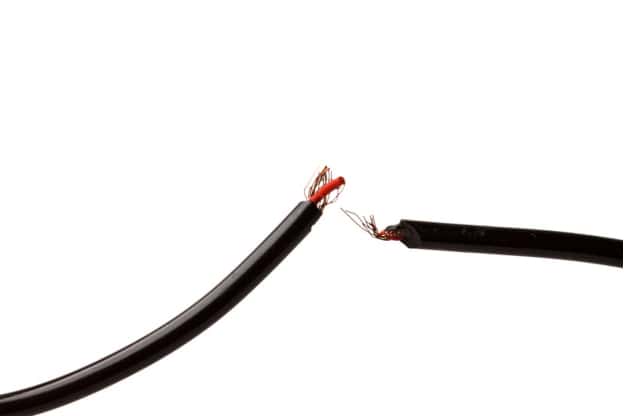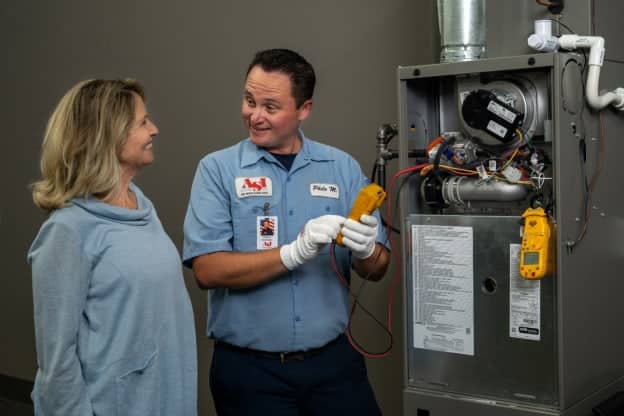Nobody wants to be cold in their own home. During the colder months, many homeowners depend on their furnaces to provide them warmth. After a while, normal wear and tear can take a toll on your heating system. To extend the life of your furnace and avoid costly replacement, consider how expert furnace repair can save you money.
Discover the secret to a perfectly heated home minus the headache. If the prospect of replacing your home’s heating system seems daunting, read on to learn why a furnace repair may be a lifesaver for your family.
Deciding Between Furnace Repair or Replacement? Consider the Lifespan
According to the U.S. Department of Energy, your furnace should typically last between 15 and 30 years. A furnace less than 15 years old is a good candidate for repair to extend its lifespan and save you money. Routine maintenance by heating professionals is a great way to prevent problems from occurring, but in the event, they do, furnace repair should be considered before jumping straight to costly replacement.
When your furnace stops working properly, basic troubleshooting is usually the first step toward diagnosing the issue. This may include replacing the furnace filter or making sure the gas valve isn’t stuck closed. Sometimes, the problem may be as simple as losing power due to a tripped circuit breaker in your home and resetting it can restore the furnace function.
Common Furnace Repairs A Professional Can Perform
Sometimes DIY solutions won’t cut it, and you need an expert HVAC technician to get your home warm again in a hurry. Here are some common furnace repairs the professionals might perform to help you avoid replacement:
Power Issues
As for most household appliances, furnaces need to be connected to a power source in order to function. If your home’s circuit breaker being reset doesn’t solve your furnace’s power issues, it may be related to a power switch that’s been turned off, a disconnect in the wiring, or problems with the electronic control board. A skilled service technician can identify these issues and perform repairs to get your furnace back in operation quickly.

Faulty Thermostat
There are several reasons a thermostat may fail – it could be related to the wiring, transformer, or the thermostat itself. Repairs to the thermostat power connection or even replacement of the thermostat itself may be the solution to your furnace problems.
Airflow Obstruction
Clogged air filters are a common culprit to furnace issues. When air filters are too dirty, they can obstruct the airflow between the blower and your home’s spaces. The blower itself may also need attention if it’s determined the air filters are reasonably clean.
The blower is a component of your heating system that moves the heated air from your furnace, through the vents and into the rooms of your home. If the blower motor or fan is worn out, replacement of those parts is a simpler fix than a new furnace.
Failure to Ignite
Your home’s furnace has either a pilot light or electronic ignition that lights a burner inside the furnace’s combustion chamber. The burner then provides heat to the heat exchanger through which air moves before entering the blower and being pushed through the ductwork into your home’s rooms.

If the first step of ignition fails, the rest of the process is halted. There are many reasons a burner may fail, from a wiring failure to a defective flame sensor – all of which are more economical to replace than the entire furnace.
Damaged Burner Assembly
The burner assembly is one part of your furnace system that is particularly susceptible to wear and tear. Over time, corrosion can occur in the heat exchanger requiring it to be replaced. The rest of your furnace, however, may have considerable life left.
Ineffective Sensors or Switches
There are multiple sensors and switches in your furnace that must operate properly in order for your home to be heated as it should. The furnace door switch tells the furnace that the door is fully shut, and it will not heat if it isn’t.
There is also a pressure switch that monitors the blower’s performance. If the pressure switch fails to sense proper airflow from the blower, the furnace won’t heat. A new switch or sensor is certainly more affordable than a whole new furnace.
Why You Should Opt For Furnace Repair Over Replacement
When deciding whether to repair or replace your furnace, the biggest two factors will likely be cost and the time it takes to get your home’s heat back. Making an informed decision with both these factors in mind will help you solve your heating issues with confidence.
Cost of Furnace Repair
The first thing you’ll probably want to know when deciding to go the route of furnace repair or replacement is how much each option will cost. The cost of furnace repair varies, of course, depending on the reason for failure, the parts involved, and the labor required to remedy the issue.

Electric furnaces are typically less costly to fix than gas or propane-powered furnaces. The total number usually comes out to somewhere between $150 to $1,000. Things like a faulty switch replacement or thermostat re-wiring run on the lower end, whereas diagnoses such as a blower motor failure or worn-out heat exchanger can run closer to four figures.
A new furnace comes with an even higher price tag, however. The average cost for a homeowner to replace their furnace is between $2,000 to $7,000, depending on factors like brand, cost of installation, and the square footage needing to be heated.
Though furnace replacement is usually the less desirable option due to upfront costs, there are times when it might be the most logical solution. If your home’s furnace is close to 15 years old or more, and the repair costs you’re facing exceed $1,000, a new furnace may be the best option.
The Time it Takes To Fix Your Heating Problems
Anytime a home appliance goes out, most homeowners want to fix it as soon as possible. When your furnace fails, especially during colder months when it might be your home’s only source of heat, it becomes even more urgent.
Besides cost, furnace repair may be the more attractive option over replacement due to the prompt manner in which repairs can usually be made. Similar to cost, this does depend on the part(s) that are found to be defective. However, many of the common issues, such as faulty sensors or clogged air filters, can be fixed quicker than the furnace can be replaced.
Other Questions to Ask Yourself Before Replacing Your Furnace
The cost to replace a home’s furnace is enough to throw a wrench in many people’s budgets. Therefore, you’ll want to make sure you’ve thought about every factor before proceeding with furnace repair or replacement.

Will You Live in Your Home for a While?
If you’re planning to sell your home soon, repairing your furnace to get it back in working order for another few years might be the best plan of action. You likely don’t want to spend thousands of dollars on a new furnace you won’t be reaping the benefits of for an extended period of time.
Is there Anything I Can Do to Increase My Furnace’s Efficiency?
Wanting your home’s heating system to run efficiently is more than reasonable. Whether you want a lower energy bill or simply to consume fewer resources, an efficient heating system is important. Though replacement is often touted as the best option to increase your home’s heating efficiency, there are several routine maintenance and small repairs that can help in this area as well.
Is My Furnace Truly at Fault for My Heating Problems?
Before jumping straight to the major cost of replacing your home’s furnace, make sure you’ve done your due diligence in diagnosing the problem correctly. Consulting a knowledgeable HVAC service technician can give you peace of mind in whatever decision you move forward with.
When it comes to your home’s heating, don’t be left in the cold. Furnace repair can get you back to a comfortable temperature without draining your savings. Contact the heating pros at ASI today.
Frequently Asked Questions
What is the most expensive repair on a furnace?
The three most expensive parts to replace on a furnace are the blower motor, heat exchanger, and draft inducer motor.
When is Furnace Repair Needed?
Some common signs that it may be time to call your trusted HVAC technician include strange or foul odors, insufficient or uneven heat distribution, fluid leaks, perpetual running without enough heating, or irregular cycling intervals.
How Much Does it Cost to Check a Furnace?
Professional furnace inspection typically costs anywhere from $75-$100 depending on the system’s complexity, time required, and specific work performed.
 Have your furnace questions answered by an ASI certified White Glove technician today, experts residential heater installation and repair.
Have your furnace questions answered by an ASI certified White Glove technician today, experts residential heater installation and repair.









Leave a reply